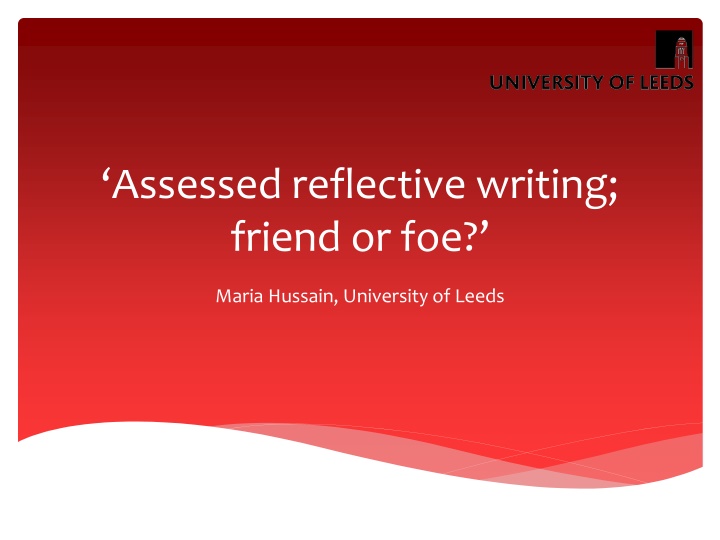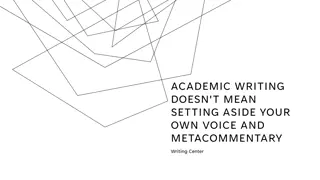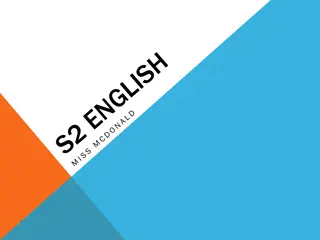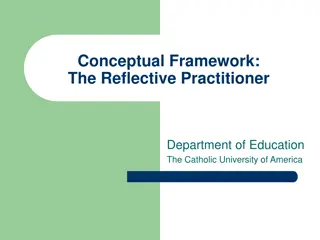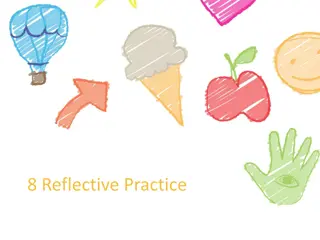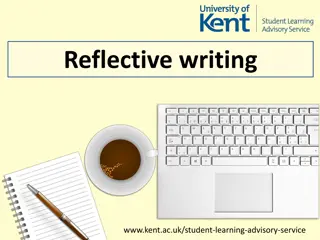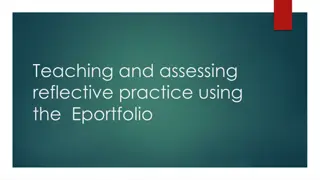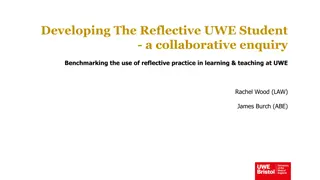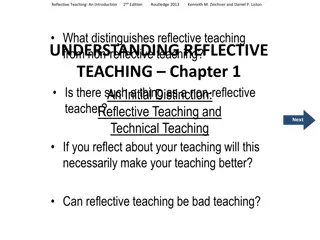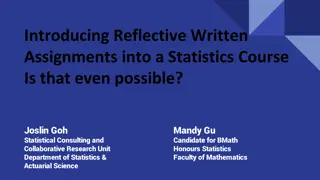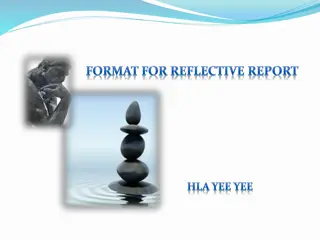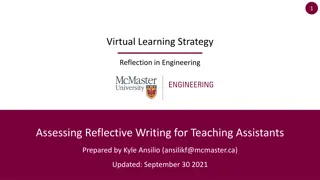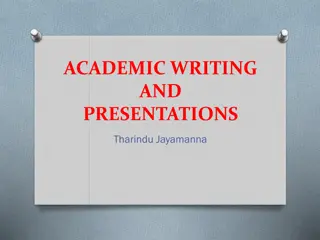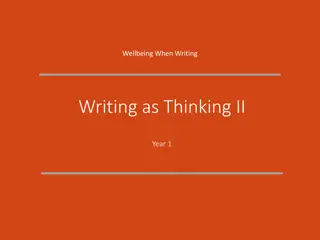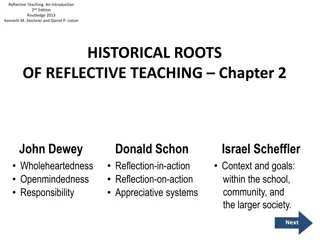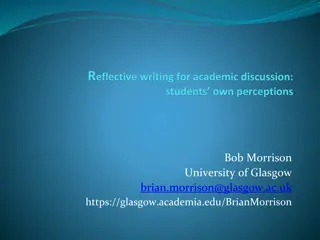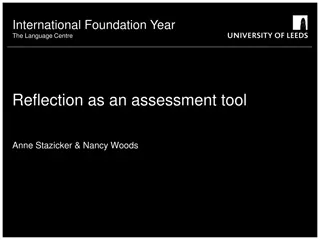Exploring the Value of Reflective Writing in Academic Development
Reflective writing plays a crucial role in enhancing learning experiences by encouraging learners to critically examine their thoughts and decisions. This assessment discusses the potential of reflective writing in academic settings, identifies barriers to its full engagement, and presents practical insights from a STEM cohort. It emphasizes the importance of reflection for effective learning and highlights the criteria and grade descriptors used for assessing reflective writing assignments at the University of Leeds.
Download Presentation

Please find below an Image/Link to download the presentation.
The content on the website is provided AS IS for your information and personal use only. It may not be sold, licensed, or shared on other websites without obtaining consent from the author.If you encounter any issues during the download, it is possible that the publisher has removed the file from their server.
You are allowed to download the files provided on this website for personal or commercial use, subject to the condition that they are used lawfully. All files are the property of their respective owners.
The content on the website is provided AS IS for your information and personal use only. It may not be sold, licensed, or shared on other websites without obtaining consent from the author.
E N D
Presentation Transcript
Assessed reflective writing; friend or foe? Maria Hussain, University of Leeds
Overview Reflective writing in the academy; current practice(s) Possible potential of RW; potential barriers to full engagement RW as a bridge to building critical thinking skills in IFY students to aid transition into the academy Report on findings from 2017-18 STEM cohort; practical insights and observations Assessed RW- is it worth it?
Reflection, whats the point? It is not sufficient simply to have an experience in order to learn. Without reflecting upon this experience it may quickly be forgotten, or its learning potential lost. It is from the feelings and thoughts emerging from this reflection that generalisations or concepts can be generated. And it is generalisations that allow new situations to be tackled effectively. Gibbs, (1988)
Defining reflective writing Reflective writing allows learners to critically examine their thought processes and influences on their decision making abilities during a specific event or timeframe (Moon, 2011).
The Leeds STEM IFY Context Annotated Bib. Assessed Disc. Lab report Presentation Abstract Reflective Writing (x3) Assessment Type Overall % of course 20% 20% 30% 20% 10% 10% Reflective writing % of assessment 10% 10% 40% 10% 10%
Marking criteria Identification of personal strengths and weaknesses Identification of related areas and opportunities for further development Content Setting SMART (specific, measurable, achievable, realistic and time achievable) targets Demonstration of insight and maturity in terms of task evaluation Demonstration of insight and maturity in terms of self-evaluation Demonstration of an understanding of long and short term use of skills Demonstration of an understanding of different contextual use of the skills. Language Accurate and effective use of grammar Accurate and effective use of vocabulary Accurate, appropriate and effective use of expressions
Grade descriptors 90-100-All criteria are fulfilled in a highly effective, consistent and sophisticated manner 80-90 All criteria are fulfilled very effectively and consistently 70-80- All criteria are fulfilled effectively and frequently 60-70-Most of the criteria are fulfilled most of the time 50-60- Fulfils an adequate number of the criteria to fulfil the task 40-50- attempts to complete the task using some of the criteria some of the time 30-40limited achievement of any of the criteria 20-30 an attempt but very little, if any fulfilment of the criteria 0-20Little or no attempt to achieve any of the criteria
Reflecting; potential barriers Cultural-factors; students from collectivist cultures, such as China may be alien to RW, and thus feel shame in revealing vulnerability or weakness. (Chitooran, 2015) Fuzziness ; What defines reflection and effective RW is often unclear. Expectations of RW are thus seem opaque to learners and assessors.(Clar , 2015) Physical factors; Environmental factors such as teacher- student relationships and perceived safety in reporting critically on process can hinder international students (Chitooran, 2015)
Ossibulla Learning game(Tuson,2009 cited in Roberts, n.d) You have a number system to learn you have 2 minutes to learn it and think of ways to teach it to your partner (without showing them!) Now, with your partner (with someone sitting behind you) decide who will be the teacher and who will be the student Teachers you have 3 minutes to teach your student (partner) the number system 0-50- be creative! There will be a short quiz
Making it explicit; providing a framework What? Describe context Describe what happened (task)- what skills were you applying/using So what? Evaluate process/outcome(s)- What went well/not very well (be specific and critical) give examples What now? Identify future strategies- Strategies to improve and contexts to apply your (new) or developing skills? (Adapted from, Driscoll, 2001)
Making it explicit; providing a framework Describe the context Evaluate process/outcome Identify future strategies (Adapted from Driscoll, 2001; Rolfe et al, 2001)
Student writing sample; before Firstly, i feel critical thinking because depending on my role i have to be against with role B, so i have to attack him with asking him, but in the same time i have to receipt him. Secondly, body language because it shows if i focus with the person who is talking or not. Thirdly, i think they tested me on using sources because it shows if my information which i said it depend on an academic sources and it shows how i extract the idea and information which i need to support my argument. I think i need to learn more vocabularies about this task and for different subjects, so i will try to read more books which include new information to be ready for any new assessed discussion also if i mixed with people who have knowledges about this task i will learn new information. However i can find this books in the libraries which in the university of Leeds and i can meet new students who have knowledges from the university. (RW on assessed discussion , pre- plenary session)
Student writing sample; after As a result, the annotated bibliography helped me to develop my skills on an academic writing such as report and essay, so that prepared me for the university in the next year if i start study my subject. Therefore, i will be ready to write any academic writing and that will be very easy to me because i have an experience on how to use academic words and how to reference the online sources in the future. I used Harvard style to reference the sources in the annotated bibliography and i learned how to reference it and that was very useful for me because i will be use the Harvard style in my subject in the future. Moreover, i learned how to distinguishing between reliable and non-reliable sources and this point is very important because it determine the credibility of our writing. As a result, the annotated bibliography helped me to learn the basic in referencing and in writing the academic writing. However, in the beginning when i felt that the annotated bibliography was difficult may that because at the school they did not thought me how to use academic words and how to reference the sources. (RW on annotated bibliography , completed post RW plenary)
Wider focus; RW in the academy Individual RW tasks: Uptake of assessed RW facilitated through PBL and experiential learning (Kolb, 1986) is increasing in STEM fields. Such as in pharmacy (Nuffer, 2013). Findings have shown an increase in analytical and evaluative skills. Group based: Noticeable increase in innovative thinking , collaboration , problem-solving ability and communication .(Bilge et al, 2017)
Aids IFY transition? Reflective writing sits well with the active learning paradigm developing mental habit of reflection at every stage. (Roberts, n.d, p7) Builds critical thinking skills (ibid) Helps students to structure thought processes more logically (see student samples of RW)
Attitudes towards assessed RW; the literature In support; Creates more active student ownership of learning and participation and fosters more learner-centredness in assessment (Creme, 1998) Learners more motivatedtowards reflecting if summatively assessed (ibid) Sceptical; Idea of assessing reflection kills off the very qualities that is supposed to foster (Creme, 2005)E.g. Idea of performance and audience leads to less honesty in writing (Ross, 2014) Formative V summative-Can we really assess reflection? If it is native to ones mind? (Clar ,2015). Inter-rater variability problems may counteract validity of RW (Moniz et al, 2015)
Attitudes towards assessed RW; my IFY students In support of RW: RW is useful academic study 57 participants 74% agreed Reflective thinking develops critical thinking skills. 80% agreed Sceptical; Assessment at undergraduate level usually includes some reflective writing. 42% still had no idea (Learning analytics from Socrative survey post plenary)
Assessed RW; friend or foe? Builds learner capacity to think critically a complex key skill of the academy (Bilge et al, 2017) Aids transition into discipline areas through assessment and genre enculturation (Chitooran, 2015;Barrows,1986) However; Need for explicit genre-based instruction (Brown,1989) Create a shared understanding of what RW is and expectations of this genre of writing amongst tutors and students alike (Moniz et al, 2015) Have an awareness of possible limitations to this mode of assessment. E.g.Writing for audience (Ross, 2014, p.227)
Final thoughts RW seems to show some positive correlations to aiding student transition and enculturation into the academy (Colley et al, 2012; Lillis, 2001) However, the assessment of such skills still remains quite controversial given the personal nature of reflection (Creme,2005, p.287)
References Barrows, H. S. 1986. A taxonomy of problem-based learning methods.Medical education, 20(6), 481-486. Bilge, S., Akyuz, B., Agri, A., & Midik, O. 2017. Rational drug therapy education in clinical phase carried out by task-based learning. Indian Journal of Pharmacology, 49(1), 102-109. doi:10.4103/0253-7613.201009 Brown,J., Collins, A & Duguid, P. 1989. Situated Cognition and Culture of Learning. Educational Researcher. 18. 10.3102/0013189X018001032. Chitooran,.M 2015.Reading and Writing for Critical Reflective Thinking .New Directions for Teaching and Learning, 143:79-95 Clar , M. 2015. What is reflection? Looking for clarity in an ambiguous notion. Journal of Teacher Education, 66(3), 261 271.doi:10.1177/0022487114552028 Colley, B., Bilics, A. and Lerch, C. 2012. Reflection: A Key Component to Thinking Critically. The Canadian Journal for the Scholarship of Teaching and Learning. 3(1),pp.1-19. Creme,P.2005 Should student learning journals be assessed?, Assessment & Evaluation in Higher Education,30:3, 287- 296, DOI: 10.1080/02602930500063850 Creme, P. 1998 New forms of writing in social anthropology at the University of Sussex, report to National Network of Learning and Teaching in Social Anthropology. Driscoll J. 2000. Practising Clinical Supervision. Edinburgh: Balliere Tindall Gibbs, G. 1988. Learning by Doing: a guide to teaching and learning methods. Oxford: Oxford Brookes Kolb, D. A. 1984. Experiential Learning: experiences as the source of learning and development. London: Prentice Hall
References Moon, J. 2004 A Handbook of Reflective and Experiential Writing. New York: Routledge. Lillis, T. (2001) Student Writing: Access, Regulation, Desire. New York: Routledge. Moon, J.2001. Reflections in Higher Education Learning. PDP Working Paper 4. York: LTSN Generic Centre Moniz, T., & Arntfield, S.,& Miller, K., Lingard, L.,Watling, C. & Regehr, Glenn. 2015. Considerations in the use of reflective writing for student assessment: Issues of reliability and validity. Medical education. 49. 901-8. 10.1111/medu.12771. Nuffer, W., Vaughn, J.,Kerr, K., Zielenski, C., Toppel, B., Johnson, L.,P & Turner, C. 2013. A Three-Year Reflective Writing Program as Part of Introductory Pharmacy Practice Experiences. American journal of pharmaceutical education. 77. 100. 10.5688/ajpe775100. Tracy,M., Arntfield, S.,Miller, K., Lingard, L,.Watling, C & Regehr, G. 2015. Considerations in the use of reflective writing for student assessment: Issues of reliability and validity. Medical education. 49. 901-8. 10.1111/medu.12771 Tsui, A. B. M., & Ng, M. M. Y. 2010. Cultural contexts and situated possibilities in the teaching of second language writing. Journal of Teacher Education, 61(4), 364 375.doi:10.1177/0022487110364855 Roberts,C. N.d. Using Reflective Writing in Your Teaching: A workshop for STEM Disciplines. [Workshop notes]. The Higher Education Academy, last accessed 26th June, 2018, available: https://www.heacademy.ac.uk/system/files/downloads/hea_guide_-_using_reflective_writing_in_your_teaching.pdf Rolfe, G., Freshwater, D. & Jasper, M. 2001. Critical Reflection for Nursing and the Helping Professions: A User's Guide. Basingstoke. Palgrave Macmillan. Ross, J. 2014 Performing the reflective self: audience awareness in high-stakes reflection, Studies in Higher Education, 39:2, 219-232, DOI: 10.1080/03075079.2011.651450 Tian, Y., Li, C., Wang, J., Cai, Q., Wang, H., Chen, X.,Li, H. 2017. Modified task-based learning program promotes problem-solving capacity among chinese medical postgraduates: A mixed quantitative survey. Bmc Medical Education, 17 doi:10.1186/s12909-017-0994-0
